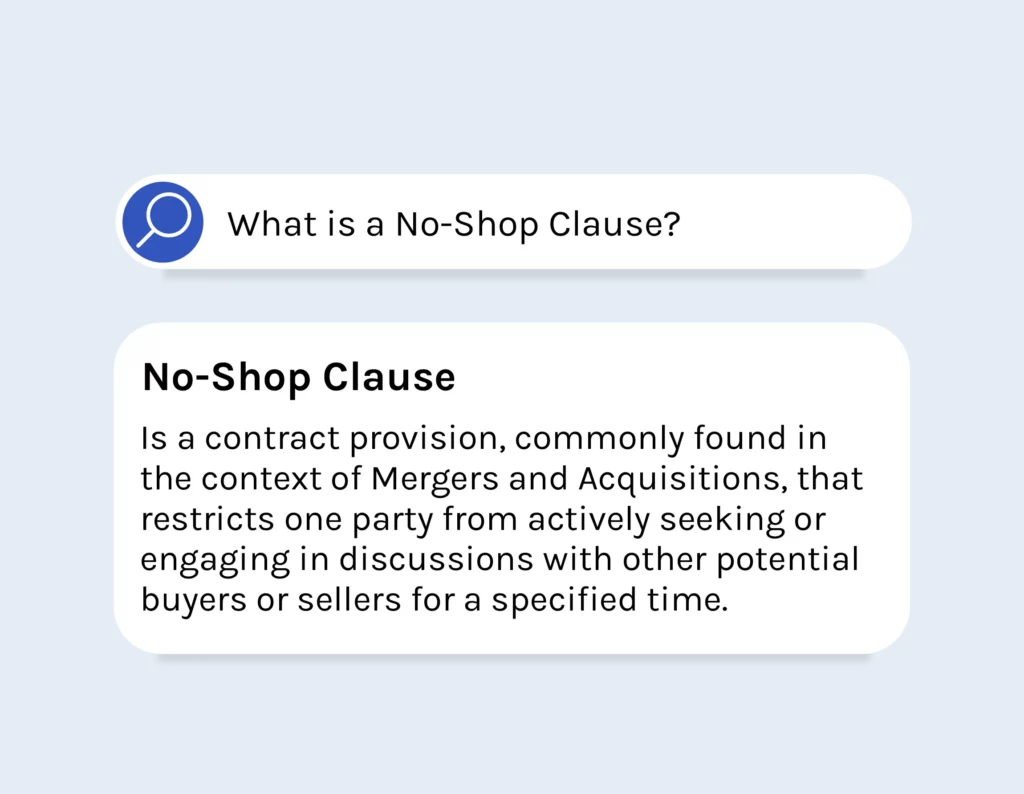What is a no-shop clause?
A non-shop clause, also known as an “exclusivity clause”, is a provision often included in business contracts, particularly in merger and acquisition (M&A) agreements and letters of intent. This clause is designed to restrict one party to the contract, typically the seller or the target company, from actively seeking or soliciting competing offers from other potential buyers or investors during a specific period of time. The purpose is to protect a party’s (or the parties’) time and investment in the negotiation process without any external interference or competition.
When should you use a no-shop clause?
Non-shop clauses are commonly used in several business contexts where one or more parties’ time, resources, and effort need to be protected from being exploited, or when the parties to a potential business deal want to stabilize and streamline the negotiation process and increase the likelihood of a successful transaction. This clause is mostly used in:
Merger and Acquisitions
When one company is in discussions with another about a potential acquisition, a non-shop clause is very commonly used in the letter of intent to prevent the target company from shopping around for better offers.
Investment Agreements
Investors may include a non-shop clause in their investment term sheet to prevent the startup or business they are investing in from seeking alternative investors for a specific period of time.
Joint Ventures
Partners entering into a joint venture may include a non-shop clause to ensure that one party does not explore alternative partnerships or business opportunities during the venture’s formation.
What should it include?
A non-shop clause should be carefully drafted to be clear, enforceable, and tailored to the specific situation. Key elements that should be included in a non-shop clause include:
- Parties Involved: Clearly identify the parties to the agreement and their respective roles, and whether any third parties are also subject to the non-shop clause.
- Duration: Specify the duration during which the non-shop clause will be in effect.
- Scope: Define the activities that the clause restricts, such as seeking alternative proposals or deals.
- Penalties: Outline the consequences of breaching the non-shop clause, which can include financial penalties or termination of the agreement.
- Exceptions: Include any exceptions or carve-out if applicable.
What happens if a party breaches a non-shop clause?
The consequences of breaching a non-shop clause can vary depending on the terms of the agreement. Common consequences are:
- Financial Penalties: The parties to an agreement can agree on an amount that the breaching party ought to pay to the non-breaching party as damages. Such financial penalties must be reasonable and it is usually calculated based on the actual expenses incurred by the non-breaching party in preparing and negotiating the agreement, which were wasted due to the breach. Sometimes damages of lost opportunity are also included.
- Termination of Agreement: The agreement itself may be terminated, leading to the collapse of the deal or partnership.
- Specific Performance: the non-breaching may also seek a court order to enforce the non-shop clause, compelling the other party to adhere to its terms.
Exceptions to a no-shop provision
While a non-shop clause is generally designed to restrict a party’s ability to seek better opportunities, there are exceptions:
A “go-shop” Clause
In some cases, the parties to an agreement may specifically agree to a “go-shop” clause, which allows the target company to actively solicit and consider alternative offers even after the initial agreement is signed. This is often used to ensure that the target company secures the best possible deal.
Fiduciary Duty
Directors and officers of a corporation may be obliged to act in the best interests of the corporation’s shareholders. If a superior offer is presented, they may be required to explore it, even if it means breaching the non-shop clause.
Conclusion
A reasonable and well-drafted non-shop clause is essential in helping to protect the interests of parties involved in a merger, acquisition, investment, or partnership, in which it provides a level of security for the parties to engage in negotiations with confidence. However, it must be carefully structured and understood, and it is advisable to seek legal counsel from a business attorney when creating or navigating the deal.


